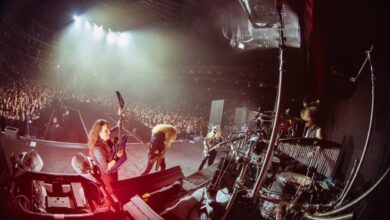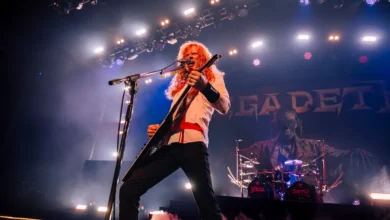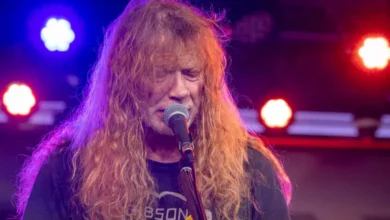Resonance Within the Walls: The Royal Marines’ Powerful Reimagining of “The Sound of Silence”
During the 2020 Mountbatten Festival of Music at London’s Royal Albert Hall, the lights dimmed until one solitary beam found Band Lance Corporal Sam McIndoe standing with his clarinet. The immense hall froze in breathless anticipation as the Royal Marines orchestra began to weave Paul Simon’s haunting melody. That first whisper of sound, floating through the woodwinds, dissolved the thousand-strong audience into stillness, leaving only the echo of memory and the fragile pulse of music lingering under the domed ceiling.
Although “The Sound of Silence” originated in the smoky folk venues of the 1960s, this arrangement radiated a contemporary gravitas—its cinematic scope clearly influenced by Disturbed’s thunderous 2015 revival. McIndoe’s clarinet carried the melody with mournful exactitude, while French horns and low brass swelled in minor harmonies that rippled like tides. It was reverent yet bold, the perfect example of a military orchestra merging tradition and innovation without sacrificing precision or soul.
As the music expanded, strings joined the tapestry—Royal Marines musicians doubling masterfully on violins and cellos. Their layered sound created a slow ascent, lifting the hall into suspension before muted trumpets and glimmering flutes took the reins. The effect was like light breaking through fog, until the Corps of Drums entered with a steady, heartbeat cadence that shifted the piece from intimate sorrow to collective remembrance.
That harmony of control and emotion reflected the intense discipline behind it. Each performer had endured the same elite Commando training as combat Marines before years of study at the Royal Marines School of Music. There, recruits mastered not only their instruments but also harmony, drill, and orchestration. The outcome is a corps able to rescue wounded soldiers one month and perform orchestral masterpieces the next—an extraordinary balance of military strength and artistic grace.
Historically, these bands were naval lifelines—performing for morale while serving as stretcher bearers during combat. By the end of World War II, more than two hundred musicians had lost their lives, the highest toll among service branches. That weight still resonates in their sound. When the low brass traced the descending bridge, it carried the unspoken names of the fallen, turning melody into memorial.
The Mountbatten Festival itself is steeped in naval tradition, named for Admiral of the Fleet Lord Louis Mountbatten. Every performance raises funds for service charities, aiding rehabilitation programs and supporting bereaved families. In that light, “The Sound of Silence” transcended performance; it became a reflection on loss and endurance, voiced by those who have lived both on and off the battlefield in quiet devotion.
Earlier in the evening, a film about resilience and post-deployment mental health had flickered across towering LED screens. That context deepened the song’s impact. When the orchestra reached the section tied to “people talking without speaking,” the room seemed to exhale. Listeners weren’t merely witnessing a cover—they were inhabiting the silence the lyrics describe, finding their own reflections within it.
Midway through, the Corps of Drums advanced in gleaming precision, white belts glinting under the spotlights. Snare rolls thundered, then eased into meticulous rim clicks that mimicked the ticking of time itself. Bugles echoed the main theme with piercing clarity, and for a moment, the Royal Albert Hall transformed into something boundless—a midnight parade ground beneath a canopy of imagined stars.
The audience’s response was visceral. Gasps gave way to hushed tears before thunderous applause rolled through the hall. The conductor had to raise his arms twice to steady the energy before the final notes faded. Within hours, clips of the performance spread across social media, amassing millions of views. Comments flooded in from veterans and civilians alike: “Thank you for giving voice to the silence we live with.”
Older generations compared the moment to wartime broadcasts crackling from radios, while younger viewers likened its scope to Disturbed’s and Pentatonix’s cinematic renditions. Yet the Marines’ version held something neither achieved: a fusion of discipline and vulnerability, where nostalgia met the sweeping grandeur of a modern film score. It was both old soul and new vision, perfectly balanced in tone.
Where Simon & Garfunkel once offered fragile simplicity, and Disturbed summoned raw intensity, the Marines forged something in between. Clarinet and brass entwined in dialogue, trading sorrow and strength. Strategic pauses cut through the sound like exhalations between heartbeats—moments when silence became an instrument itself. Each rest was deliberate, a reminder that even quiet carries resonance when held with purpose.
Royal Albert Hall’s magnificent acoustics magnified the smallest gestures—a single triangle chime rippled upward like a signal flare. Natural echoes filled the pauses, expanding the illusion of hidden choirs joining unseen. Architecture became part of the orchestration, each archway and balcony reflecting the sound as though the building itself were participating in the performance’s emotion.
Ironically, a song once tied to protest and anti-war sentiment found new meaning within military ranks. Yet there was no contradiction—only dialogue. This performance transformed it into a message of empathy and understanding, soldiers giving voice to the very silences they’ve carried home. In an age when conversations about mental health are finally being heard, its symbolism felt profoundly relevant.
Beyond grand halls, the Royal Marines Band Service continues its mission across hospitals, schools, and outposts, using music as bridge where language falters. Their repertoire spans classical suites to pop anthems, but “The Sound of Silence” has become their emblem—a piece requested everywhere from remembrance ceremonies to humanitarian events. Each performance carries the stillness born in that hall, a calm carved from discipline and grace.
When the last chord dissolved into the vaulted expanse, the musicians stood unmoving, waiting until the echo itself vanished. Then the hall erupted—cheers, stomps, and the soft rattle of medals striking uniforms. Within that thunder lay the essence of the evening: proof that even warriors find truth not in battle, but in music’s quiet confession. It was a moment where silence spoke louder than sound.
At the same 2020 Mountbatten Festival of Music, the Royal Marines also performed Hans Zimmer’s legendary Gladiator theme, turning the Royal Albert Hall into a cinematic battlefield of sound. With sweeping strings, thunderous percussion, and brass that echoed like ancient legions, they captured both the sorrow and triumph of the film’s score. The performance blended orchestral precision with raw emotion, leaving the audience breathless as the haunting melodies of Now We Are Free rose beneath the hall’s glowing arches.





